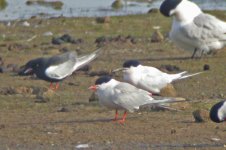The second, in which consensus seems more distant, concerns whether or not birders' behaviours and skills are being adversely affected by the easy availability of digital pictures. The voices on here so far include some who have recently started birding and are definitely using digital photos as a substitute for learning: these people should have a field guide in their pocket and be spending effort on combining its information with their observations. The frozen moments in photographs will not teach them about tail pumping, wing-flicking, the bouncing walk of a Jack Snipe and so on. The absence of scale from photographs will not teach them that a Barred Warbler is massive while a Garden Warbler is not. One or two posters have definitely indicated that they are after a tick rather than birdwatching as I understand it.
John
Higlight "are definitely using digital photos as a substitute for learning".
Maybe a very few, and it doesn't sound like they are all beginners. The vast majority seem to be using bird photography as just another tool to speed the learning process and enhance their enjoyment. Learning is speeded by the amount of time you spend observing the bird. While you are trying to get a decent photo, you are observing the bird, you do see the mannerisms (tail flicks or whatever), the way it is moving or flying, you have to take account of these to get your photo. In other words, you are learning the jizz.
I will admit to be an "early adopter" of bird photography as an aid to id. I am colour blind, but when I was young was fortunate that I managed to afford a decent camera and a second hand cheapish 500 (mirror) lens. I started taking photos so that I could refer them back to someone who was not colour blind for help. The field guides were not written for me, what was the use of "olive green to khaki" when the bird looked brown ? So I only learnt the difficult ones with help. Unfortunately I wasn't wised up to calls, but that might partly have been the fact that the guides descriptions of the calls are written in a form which is pretty opaque to me, and the fact that no-one I knew considered the calls.
I have never listed as a personal interest, only record systematically for survey/ringing. I don't see records as worth the effort unless they are submitted to be used as part of a scientific study. So, I am not photographing to prop up my list, I am photographing still to help my (and my wife's) learning. We do this with all sorts of wildlife - invertebrates, flowers, mammals ... We often carry a bird and/or flower guide, but not a library for all
taxa. We do consider what we see in the field, but still, especially in foreign parts, often find the photos invaluable confirmation or correction. Having a first id confirmed is essential before one can go on and become familiar with that bird, able to id confidently. Photography is one of the tools that speeds that process.
The same can be said of song recordings. We can now carry an mp3 player and listen to calls in the field, speed the learning process for new birds. This has been very beneficial for skulkers. We learned to recognize nightingale song very quickly, not sure we have ever had a really good view (except in the hand). Sub-alpine warbler was another, but one day we came across one that preferred to sit on the top of a particular bush to sing, and seemed very settled while being photographed.
Yes, technology has changed the way we bird ... and has sped our learning process, not substituted for it.
Mike.
P.S. I tend to use the bins before I photograph ... the boss thinks I should photo first as she is getting the view through her bins anyway. Of course I sometimes don't get a photo at all !






